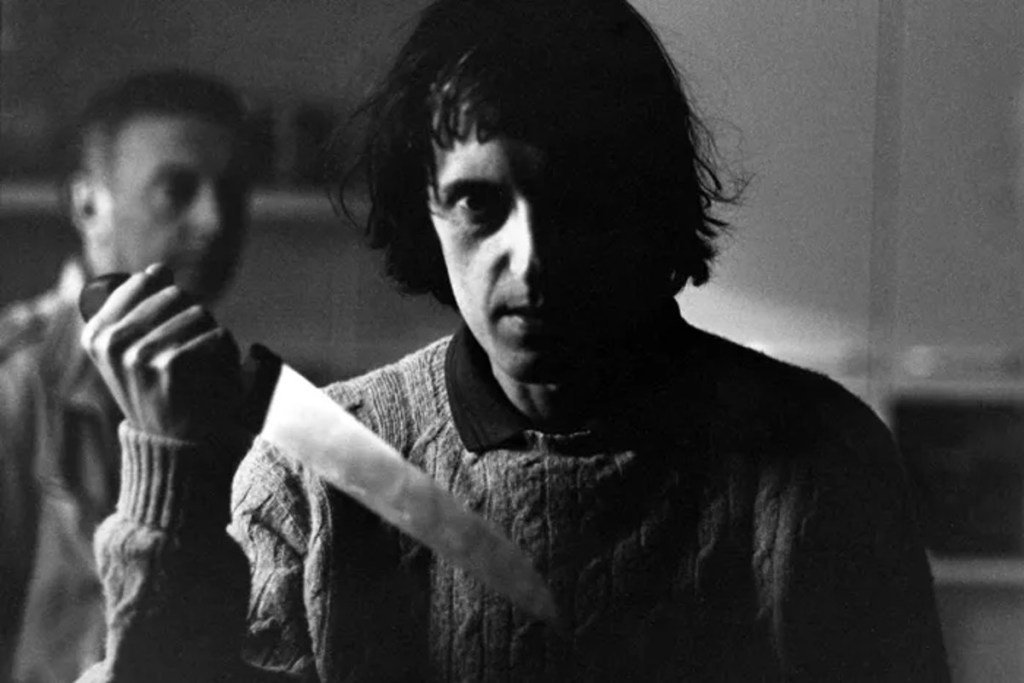If you’re a fan of horror movies at all, you’re probably already familiar with the works of Italian filmmaker Dario Argento. However, how much do you know about the man himself? What motivates him? How does he work? What do his family members make of his nightmarish efforts? All of these topics and more are touched upon in Simone Scafidi’s new documentary for Shudder entitled Dario Argento Panico.
With a film crew in tow, the beginning of the film finds Argento heading off to a hotel for some seclusion and writing. Evidently, in the old days, this was how he liked to write, seeking isolation to assist in drawing forth the darkest aspects of his imagination and psyche. Now in his early 80s, we can see the weight of time on his face and in his slow gait, but there’s still a bit of cantankerous bite to his speech and intense love for his art. In various spots around this beautiful estate, Argento recounts stories about how he grew up, what his parents were like, and his romantic relationships. There are also candid moments, too, like when the maestro complains about the accommodations or when he deliberates on what to order for breakfast.
Scafidi’s last major effort, Fulci for Fake, utilized dramatic reenactments that made that picture flit between documentary and biopic. I quite enjoyed it, but I also wouldn’t say it was completely successful with what it set out to do. Here, Scafidi deploys a more traditional approach. We have the current interviews with Argento made specifically for this film, archival videos and photos, and clips from his most famous works. We also get discussions with family members, including his ex-wife, his sister, and his older daughter. Unsurprisingly, younger daughter Asia Argento gets much more screen time than the rest of this group, though. Sprinkled in are words of praise from famous admirers Nicolas Winding Refn, Guillermo del Toro, and Gaspar Noe, along with Italian acolytes Michele Soavi and Lamberto Bava. Del Toro is especially welcome here, as he always provides good insight, and I appreciated his contextualizing of Argento’s disregard for realism.
Of course, the music of Goblin played a huge part in some of Argento’s most beloved films, and the legendary musicians receive a relatively sizable chunk of coverage in the film. Claudio Simonetti himself is called upon to recount the band’s history and their role in Argento’s cinema. For what it’s worth, the collaboration between three former members of Goblin for Tenebre is my favorite of Argento’s scores.
Dario Argento Panico isn’t just a fawning love letter to the maestro, though. Daughter Asia seems at least unsettled by some of her experiences working for her father, and rightfully so considering she did a sex scene under his direction. Additionally, Cristina Marsillach, the star of Argento’s Opera, recounts troubling experiences with Argento that obviously left some scars, both physical and psychological.
All of this comes together remarkably well and feels much more polished than Fulci for Fake. The script was written by Scafidi, Manilo Gomarasca, Giada Mazzoleni, and Davide Pulici. A basically linear approach is used in discussing Argento’s life and work, and editor Claudio Rossoni pieces it all together in an easy-to-follow fashion. DP Patrizio Sacco is mostly called upon to shoot talking heads, but he ensures everyone looks good and that the framing is competently composed. Composer Alessandro Baldessari complements the tone of the piece while staying out of the way when Goblin has the floor. I do wish that the runtime was a little longer, as it’s a mere 98 minutes, but the film isn’t meant to be comprehensive or exhaustive. It’s satisfying, no doubt, but I suppose it’s not bad to leave us wanting more.
Simone Scafidi’s Dario Argento Panico is a revealing look at horror royalty. It’s a film that I think will appeal to both Argento superfans as well as neophytes. It’s well-made, entertaining, and informative. Highly recommended for fans of Stanley Kubrick: A Life in Pictures, Jodorowsky’s Dune, and Diary of a Deadbeat: The Story of Jim VanBebber. It should be noted that much of the film features spoken Italian and is subtitled. It premieres on Shudder’s streaming service today.
Michael Cavender



